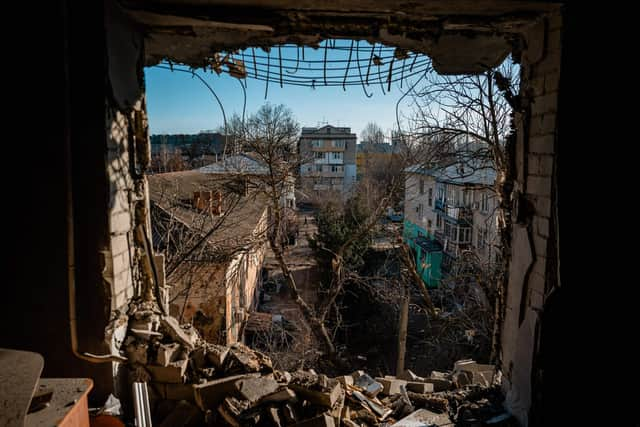There’s no triumph in death, both sides in the Ukraine and Russia conflict must be guided to peace - Patrick Mercer
As a result he wasn’t at his unit’s memorial service which followed - but he heard all about it. The padre - a gifted speaker and hugely popular - told the Commanding Officer that prayers would be offered for the German dead as well as their own as they were ‘all God’s children’. There was no demur: Britons stood in the sand and prayed for their fallen enemies and comrades alike.
I was profoundly moved by my father’s story: equally profoundly, I’m now appalled by the position that the Church of England has taken on the current war in Ukraine.
Advertisement
Hide AdAdvertisement
Hide AdI can’t speak for other parts of the country, but when President Putin’s ‘special military operation’ began in February, I saw Ukrainian flags fluttering all over Nottinghamshire and South Yorkshire, but ten months later most have disappeared. The odd, tattered, blue and yellow standard still hangs limply in the drizzle, but for the most part they’ve given way to World Cup emblems or just fallen out of fashion completely.


Except, of course, for many of our churches which stick not just to flags outside (my own parish even flies a Ukrainian one in preference to the Union Jack), but also to displays and shrines inside. I’ve not seen any mention, though, of the Russian peoples’ suffering, especially when we’re told how opposed most of their population is to their leaders’ aggression.
But look at the C of E’s webpage - it’s coloured yellow and blue. Two prayers are suggested: one, evenhandedly, asks for the ‘peace of the world’ but the other is entitled ‘A Prayer for Ukraine’ with the names of the Archbishops of York and Canterbury at the bottom. Russia gets scant sympathy, though, and I’ve yet to see a display where the flags of both protagonists are represented equally with a call to the Almighty to bring the two sides to their senses and end this needless slaughter.
Leaving who started the fighting to one side for a moment, there was a point earlier in the year when it looked as though Ukraine could have been persuaded to sue for peace. Obviously, we will never know the details, but on April 9 the European Commission president, Ursula von der Leyen, and Poland’s president, Andrzej Duda visited Kiev whilst the next morning the Austrian chancellor Karl Nehammer arrived just before a surprise visit by our then Prime Minister, Boris Johnson.
Advertisement
Hide AdAdvertisement
Hide AdEqually obviously, we will never know exactly what was agreed between Mr Johnson and President Zelensky, but it’s now widely believed that our premier talked Ukraine’s leader out of any compromise with Russia which might have been suggested by the EU bigwigs and instead stiffened his resolve to carry on fighting.
Ironically, had a truce been implemented then, there was a good chance that things would now be different. Heavily mauled Russia might have withdrawn to the pre-February 24 boundaries, Ukraine would have avoided the wholesale destruction that we’re now seeing, a violent incursion might not have escalated into brutal mayhem, millions would not have had to flee their country and, most importantly, hundreds of thousands of young soldiers, sailors and airmen would still be alive.
In the face of the then prime minister’s jingoism, wouldn’t it have been a wonderful thing for Archbishop Welby to raise his voice for peace: an unconditional peace that neither favoured nor blamed, but simply urged the killing to stop? Now, a cynic might say that as the Archbishops are chosen by the Prime Minister they have a duty to support the government of the day, but that cannot be right. Indeed, we’ve seen vociferous comments from Archbishop Welby which are wholly at odds with Westminster over subjects as diverse as Brexit and immigration policy. Why, then, is he so meekly compliant when it comes to the war in Ukraine?
In a similar vein, I question the Archbishop’s recent trip to Kiev. Quite rightly he visited clergy, refugee organisations and charities, yet his own website stated that “The Archbishop is making the Advent visit to show solidarity with the people and churches of Ukraine as they face ongoing Russian bombardment and a profoundly difficult winter”.
Advertisement
Hide AdAdvertisement
Hide AdBut why were these comments so partisan? This is not our war, British forces aren’t dying out there. In these circumstances the Archbishop should be neutral, shouldn’t he, deploring all violence and death? And wouldn’t it have been better if this trip had been followed by a similar inspection of, say, Donetsk in the Donbas where civilians are under ‘ongoing bombardment’ from President Zelensky’s troops?
His Grace is not alone, though. He’s in august company with the Pope imploring, “Let's have a more humble Christmas, with more humble gifts. Let's send what we save to the Ukrainian people, who need it.”
Christmas is here yet the guns still thunder almost a year after this wholly avoidable conflict in Ukraine began in earnest. Inevitably, in the new year we will see more offensives, more destruction and more misery: is it too much to hope that our leaders will realise that there’s no triumph in death and guide both sides towards peace?
Patrick Mercer is a former MP for Newark and Army colonel.